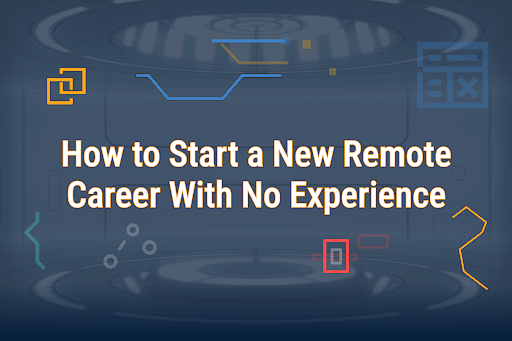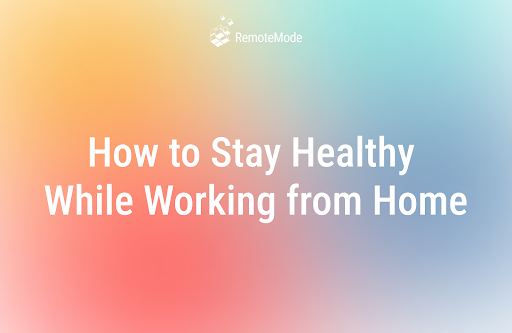How to Start a New Remote Career With No Experience

Many people dream of working from home and moving on from their current roles. But the reality is that it can be difficult to get started in a remote career. One of the biggest challenges is that you often need to have experience in the field you want to work in, and this can be difficult to obtain if you're not already employed in that field.
In addition, most remote jobs require good written and communication skills and the ability to use technology for things like video conferencing and online collaboration. And even if you do have all of the required skills, it can still be tough to stand out from the competition when applying for remote jobs.
So if you're hoping to start a new remote career, it's important to know the challenges you may face and how to build a roadmap to success in a new remote career.
Identify Ideal Career Options
Making a career transition can be daunting, especially if you don't have any experience in the field you're interested in. However, with a little research, you can find a career that's a great fit for your skills and interests. Start by identifying what you're good at and what you enjoy doing. Once you've narrowed down your options, take the time to learn about the different careers available to you—Research the duties of each position, the required qualifications, and the average salary. Then, ask yourself which starting level you'd be comfortable with. With a little effort, you can start to narrow down the career paths that make sense for your next step and can use the skills you've accumulated thus far.
Invest in Learning that Maximizes Your ROI
When making a career transition, it's important to level up the skills required for the new position. However, it's also important to invest in learning that will propel you into a compensation range that can justify the investment. For example, if you're transitioning into a role that requires project management skills, it may be worth investing in a certified project management course. Not only will this give you the skills you need to excel in your new role, but it will also help you to command a higher salary. When making a career transition, it's important to carefully consider the return on investment and the timeline of any learning opportunities that you pursue. By investing in learning that maximizes your ROI, you'll set yourself up for success in your new career.
Update Your Resume to Highlight Similar Skills
When you're looking to make a career change, it's important to update your resume to reflect the skills and experience relevant to your new field of interest. People often have the necessary skills for a new career, but their resume doesn't reflect that. By taking the time to highlight your similar skills, you'll be able to show potential employers that you have what it takes to succeed in a new role. For example, if you're looking to transition from sales into marketing, highlight your experience with developing and executing marketing campaigns. By updating your resume to highlight similar skills, you'll be well on your way to making a successful career transition.
Get in Touch With Your Network for Opportunities
No matter what industry you're in, having a strong network is important. Your network can provide leads on new opportunities, help you connect with potential employers, and give you advice when needed. Your network is even more important if you're looking for a remote job. Here are a few ways to make sure you're staying in touch with your network and taking advantage of all the opportunities it has to offer:
- Reach out to friends, family, and former colleagues for leads on remote jobs. These people know you and your work style, so they may be able to point you in the right direction.
- Attend job fairs and online networking events designed for remote workers. These events are an effective way to meet other remote workers and learn about new opportunities.
- Join online communities and forums related to your industry. These communities can help you connect with potential employers and learn skills about how to promote your profile.
Maintaining a strong network is essential for any job seeker, but it's especially important if you're looking for a remote position after making a career transition. By taking advantage of your network, you'll increase your chances of finding the ideal job for you.
Leverage Remote Work Platforms
Once you're ready to start applying for jobs, there are several online platforms you can use to find open positions, whether you're looking for contract work or full-time employment. Sites like Indeed and LinkedIn are always a good place to start your search, as they feature many open positions from various companies. However, several specialized remote work platforms can be worth exploring. For example, if you're looking for writing or editing work, sites like Upwork and Fiverr may have relevant openings depending on the field you're looking to freelance in. By leveraging these tools, you'll find the right position for your skills and interests.
Prepare for Interview Process
When you're ready to start applying to remote jobs, you must be prepared for the interview process. Practice common questions and think about answers that will sell you as the perfect candidate. You should also be prepared to discuss your skills and experience in detail, as well as your motivation for wanting to work remotely. The more you can highlight how your previous career and learning set you up for the role, the more you can tell your story in a compelling way. So take some time to brush up on your interviewing skills and knowledge of the remote job market before applying. With a little preparation, you'll be on your way to landing your dream career.
Take the first step to your new remote career!






